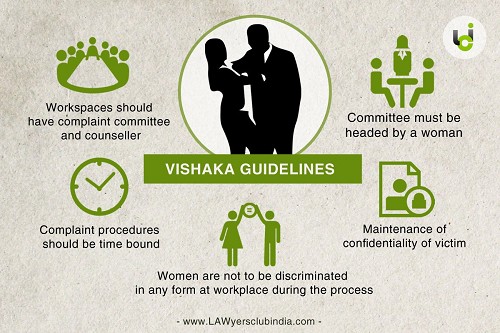Introduction:
Prevention of Sexual Harassment at Workplace Act (POSH) is being the first of its kind. The Rules and Act on sexual harassment at the workplace were enacted on 9th December 2013, much before the #MeToo movement. The enactment of POSH Act, 2013 has led to awareness on the dos and don’ts in terms of workplace conduct. This Act provides a mechanism for and aims at prevention, prohibition, and redressal of complaints of sexual harassment at the workplace. Sexual harassment and cruelties against women at the workplace is a common issue far and wide. The media has played a major role by highlighting several high profile incidents of sexual harassment at the workplace.
Sexual Harassment:
It is difficult to define Sexual Harassment as it involves a range of behaviors which is subjected to different interpretations. In general terms, it can be defined as an unwelcoming behavior with sexual nature. A minute accidental physical contact, even though it might be unwelcomed, would not amount to sexual harassment.
Initially, before the enactment of the Act, the Supreme Court of India laid down the Vishakha Guidelines (Vishakha v. State of Rajasthan) to govern the mechanism redressal of complaints received by the complaints committee of any organisation. It may include one or more than of them,
- Physical contact and advances;
- A demand or request of sexual favors;
- Making sexually colored remarks;
- Showing pornography;
- Any other unwelcome physical, verbal, or non-verbal conduct of sexual nature.
Workplace:
It is important to know and understand the expression ‘workplace’ under the POSH Act. It should be given broader and wider meaning in order to make sure that no area is left uncovered where women may be subject to sexual harassment.
The expression “Workplace” is defined under Section 2(o) of the POSH Act, as a private/ public or non-governmental organisation or service provider and places visited by employees arising out of or while working under the organisation, including transportation provided by the employer for undertaking a journey. Therefore, if harassment takes place with the employee during transportation or while having lunch in a meeting at a restaurant, the same will be covered under the Act.

Internal Committee:
Section 4 of the POSH Act throws light on the term “Internal Committee“. As per the guidelines, every workplace that has 10 employees or more is required to form an Internal Committee (IC) that should be formed at all administrative units and offices. The main objective of the constitution of an Internal Committee is to receive complaints of sexual harassment and redressal thereof. In case of non-constitution of an IC in a company would lead to a hefty fine of Rs. 50,000 and double the amount of fine for repeating the same offence. Further, in case of repeated non-compliance, the company will be penalized with withdrawal, non-renewal or cancellation of business licenses.
The IC should be headed by a woman and not less than half members of the committee should be women. Further, to avoid undue pressure or influence from senior levels, therefore, the committee should involve a third party, either NGO or a body familiar to or has experience with the issue of sexual harassment at workplace.
Relief for Victim:
As per the Section 12 of the POSH Act, the employer shall grant relief to the victim, such as transfer the aggrieved woman to any other workplace or grant leave up to a period of three months (except for the leaves she would be otherwise entitled to) during the pendency of the enquiry only if the victim has given a written request.
Conclusion:
Sexual Harassment is one of the serious issues in the workplace and women are easy targets for these kinds of offences as they are considered to be fragile. However, India is late in formalizing sexual harassment at the workplace as an offence punishable with imprisonment, fine or both. The Government of India has been taking steps to monitor implementation of the POSH Act in all the sectors. However, it is the responsibility of the victim to step up and report such incidents and create awareness about the rights of the victims.
Join LAWyersClubIndia's network for daily News Updates, Judgment Summaries, Articles, Forum Threads, Online Law Courses, and MUCH MORE!!"
Tags :Others










